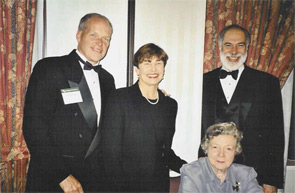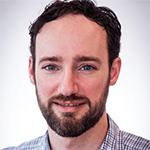Leslie Hanrahan, vice president of education and research at The Lupus Foundation of America (LFA), credits Dr. Hess’ research with helping to put lupus on the map. Recognizing Dr. Hess’ contributions to advance lupus research, the LFA in 2005 established the Evelyn V. Hess MD, MACP, MACR Award, presented at the ACR annual meeting each year to a clinical or basic researcher whose body of work has advanced the pathophysiology, etiology, epidemiology, diagnosis, or treatment of lupus. As a testament to Dr. Hess’ stature in the field, the number of nominations has grown in just six years, notes Hanrahan.
Putting patients first also involved, for Dr. Hess, an approach to patient examination which has almost become “a lost art,” according to Dr. Luggen. “What I carry from those years that I trained with her,” says Dr. Farhey, “is never to take for granted what other people may say about a case. Every single time you see a patient, see that patient with new eyes, and you’re bound to find something new. Whenever I did this, I was never disappointed.”

Dr. Hess has always believed in the importance of people with lupus being involved in their care. She carried that belief into action, becoming a charter member of both LFA and Arthritis Foundation. She still attends LFA board meetings. “For her,” says Hanrahan, “it’s all about the patient.”
The awards and accolades for Dr. Hess’ achievements have been numerous. She was named one of the Cincinnati Enquirer’s 1999 Women of the Year, received a Pan American League of Associations of Rheumatology Gold Medal in 2010, and received a Leadership Award from the Greater Cincinnati AIDS Task Force in 1991, having stepped up to the plate with HIV/AIDS patients ahead of many of her peers.
Dr. Hess received the American College of Physicians (ACP) Master Teacher Award in 1995, and in 2007, the ACP began awarding the Evelyn V. Hess Master Teacher Award to other young physician teachers. Dr. Hess remarks that she always enjoys teaching. “It’s good to be able to survive fellows,” she jokes. “And none of them went to jail!” On a more serious note, she reflected, “We need new generations of clinician–researchers now more than ever, because the rheumatic diseases have turned out to be quite complicated. You’ve really got to be an expert in immunology, rheumatology, and everything else. So we need young people who want to take the challenge.”


